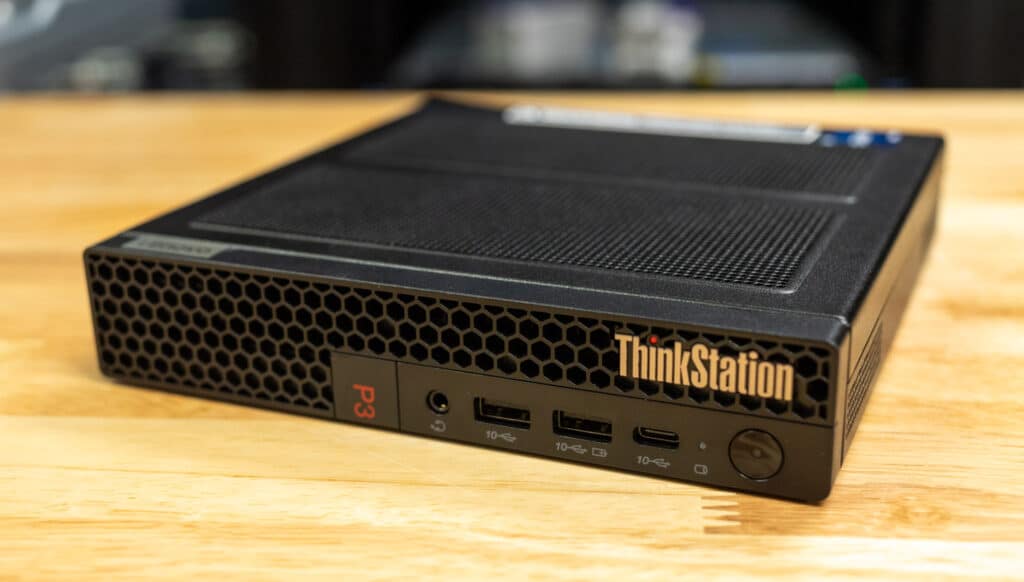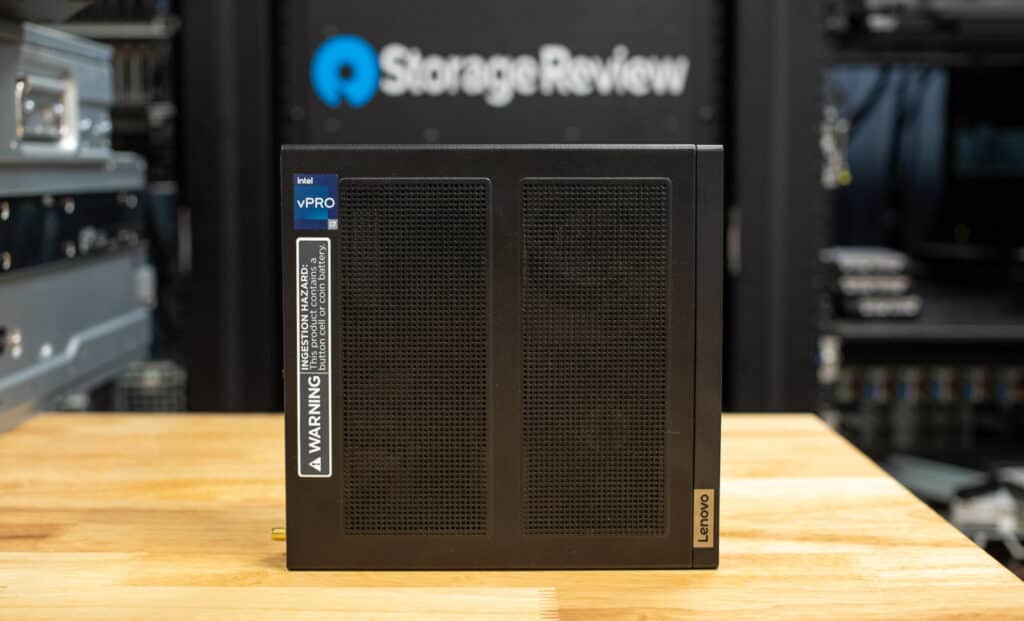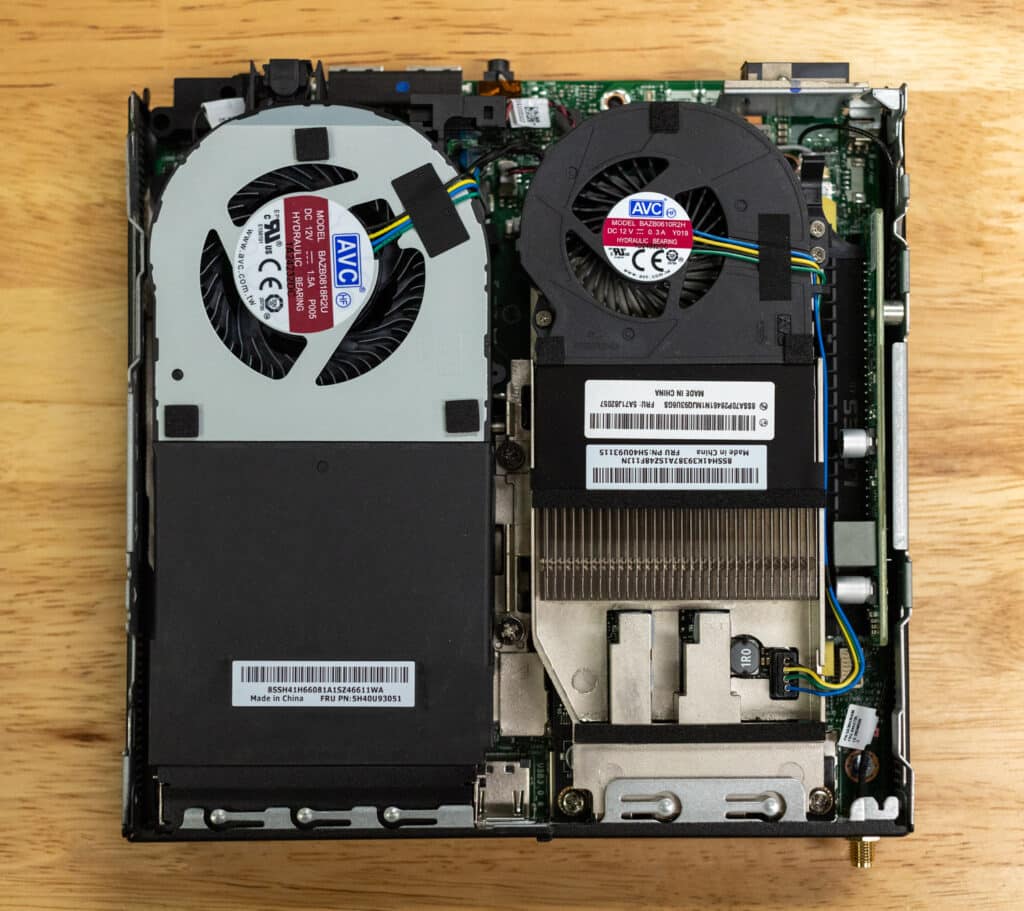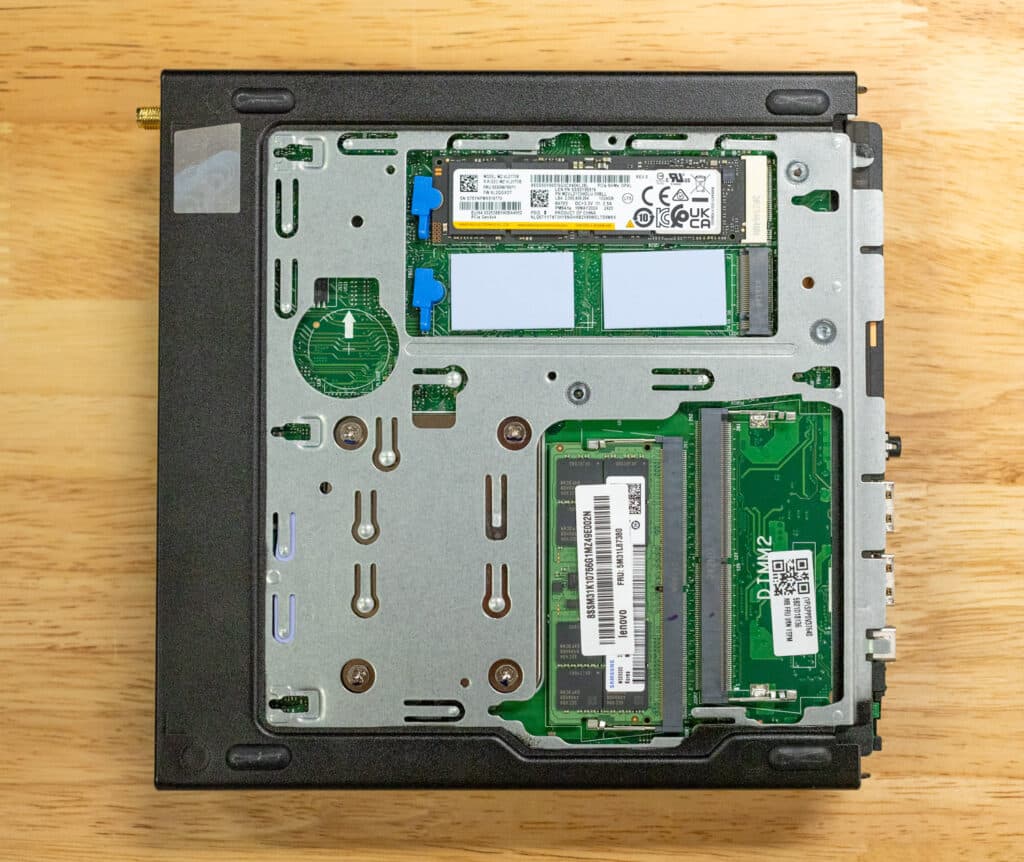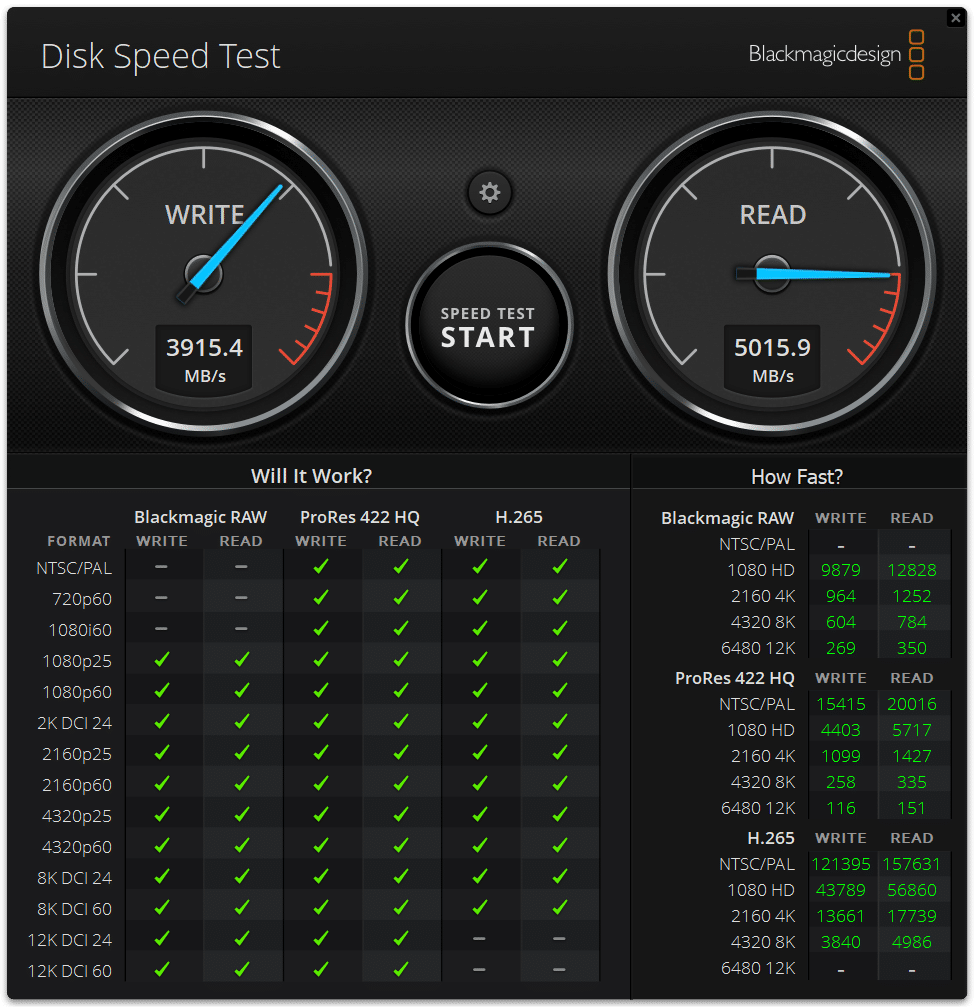The Lenovo ThinkStation P3 Tiny is an excellent choice for a compact, high-performance workstation without compromising features.
The Lenovo ThinkStation P3 Tiny workstation redefines compact power with its 1-liter design, delivering top performance for professional use. Equipped with the latest Intel Core processors, NVIDIA RTX Workstation graphics, high-speed memory, and cutting-edge storage, this workstation is designed for maximum flexibility and configurability. Built with Lenovo’s trusted reliability and enterprise-level support, it’s ideal for demanding industries like Media & Entertainment, AEC, and Finance, offering the performance power users need in a remarkably small form factor.
P3 Tiny – CPU Support
The Lenovo ThinkStation P3 Tiny Workstation is a compact, versatile workstation that meets various business needs through a wide range of Intel 13th and 14th Gen Core processor options. This workstation offers significant processing power in a small 1L form factor, making it ideal for offices or environments where space is at a premium. The ThinkStation P3 Tiny also allows dual-display support out of the box (HDMI and DisplayPort) and up to six displays with an optional discrete GPU, broadening its appeal to users with more extensive display requirements.
Processor Options
The ThinkStation P3 Tiny has a large selection of supported 13th and 14th Gen Intel Core processors, allowing businesses to choose an ideal setup based on their workload needs. Here’s a breakdown of the supported CPUs:
| 13th Generation Intel® Core™ Processors | Total Cores & Threads | E-Core Boost (Max) | P-Core Boost (Max Turbo) | Cache |
|---|---|---|---|---|
| Intel® Core™ i5-13500 Processor with vPro® | 14 Cores 20 Threads |
3.50 GHz | 4.80 GHz | 24 MB |
| Intel® Core™ i5-13500T Processor with vPro® | 14 Cores 20 Threads |
3.20 GHz | 4.60 GHz | 24 MB |
| Intel® Core™ i7-13700T Processor with vPro® | 16 Cores 24 Threads |
3.60 GHz | 4.80 GHz | 30 MB |
| Intel® Core™ i9-13900T Processor with vPro® | 24 Cores 32 Threads |
3.90 GHz | 5.10 GHz | 36 MB |
| Intel® Core™ i3-13100T Processor | 4 Cores 8 Threads |
No E-Cores P-Cores only |
4.20 GHz | 12 MB |
| Intel® Core™ i3-13100 Processor | 4 Cores 8 Threads |
No E-Cores P-Cores only |
4.50 GHz | 12 MB |
| Intel® Core™ i5-13400T Processor | 10 Cores 16 Threads |
3.00 GHz | 4.40 GHz | 20 MB |
| Intel® Core™ i5-13400 Processor | 10 Cores 16 Threads |
3.30 GHz | 4.60 GHz | 20 MB |
| Intel® Core™ i5-13600 Processor with vPro® | 14 Cores 20 Threads |
3.70 GHz | 5.00 GHz | 24 MB |
| Intel® Core™ i5-13600T Processor with vPro® | 14 Cores 20 Threads |
3.40 GHz | 4.80 GHz | 24 MB |
| Intel® Core™ i7-13700 Processor with vPro® | 16 Cores 24 Threads |
4.10 GHz | 5.10 GHz | 30 MB |
| Intel® Core™ i9-13900 Processor with vPro® | 24 Cores 32 Threads |
4.20 GHz | 5.20 GHz | 36 MB |
| 14th Generation Intel® Core™ Processors | Total Cores | E-Core Boost (Max) | P-Core Boost (Max Turbo) | Cache |
| Intel® Core™ i3-14100T Processor | 4 Cores 8 Threads |
No E-Cores P-Cores only |
4.40 GHz | 12 MB |
| Intel® Core™ i3-14100 Processor | 4 Cores 8 Threads |
No E-Cores P-Cores only |
4.70 GHz | 12 MB |
| Intel® Core™ i5-14400T Processor | 10 Cores 16 Threads |
3.20 GHz | 4.50 GHz | 20 MB |
| Intel® Core™ i5-14400 Processor | 10 Cores 16 Threads |
3.50 GHz | 4.70 GHz | 20 MB |
| Intel® Core™ i5-14500T Processor with vPro® | 14 Cores 20 Threads |
3.40 GHz | 4.80 GHz | 24 MB |
| Intel® Core™ i5-14500 Processor with vPro® | 14 Cores 20 Threads |
3.70 GHz | 5.00 GHz | 24 MB |
| Intel® Core™ i5-14600T Processor with vPro® | 14 Cores 20 Threads |
3.60 GHz | 5.10 GHz | 24 MB |
| Intel® Core™ i5-14600 Processor with vPro® | 14 Cores 20 Threads |
3.90 GHz | 5.20 GHz | 24 MB |
| Intel® Core™ i7-14700T Processor with vPro® | 20 Cores 28 Threads |
3.70 GHz | 5.00 GHz | 33 MB |
| Intel® Core™ i7-14700 Processor with vPro® | 20 Cores 28 Threads |
4.20 GHz | 5.30 GHz | 33 MB |
| Intel® Core™ i9-14900T Processor with vPro® | 24 Cores 32 Threads |
4.00 GHz | 5.10 GHz | 36 MB |
| Intel® Core™ i9-14900 Processor with vPro® | 24 Cores 32 Threads |
4.30 GHz | 5.40 GHz | 36 MB |
P3 Tiny – Build and Design
The ThinkStation P3 Tiny measures 182.9 mm tall, 179 mm deep, and 37 mm wide, making it compact enough to fit in tight office spaces. It packs an NVIDIA T1000 GPU housed in its 1-liter chassis, delivering solid graphical performance for professional tasks. While it doesn’t feature VESA mounting, its design allows it to fit easily under or on a desk, taking up minimal space. Additionally, it comes with a provided vertical stand for flexible placement options.
Moving to the front I/O panel, you’ll find a headphone/microphone combo jack (3.5mm), two USB-A ports (USB 10Gbps), one of which is Always On, and a USB-C port (USB 10Gbps) for data transfer. There’s also a power button for easy startup and a disk activity light to indicate ongoing storage operations, all within a compact design that ensures easy access and enhanced functionality.
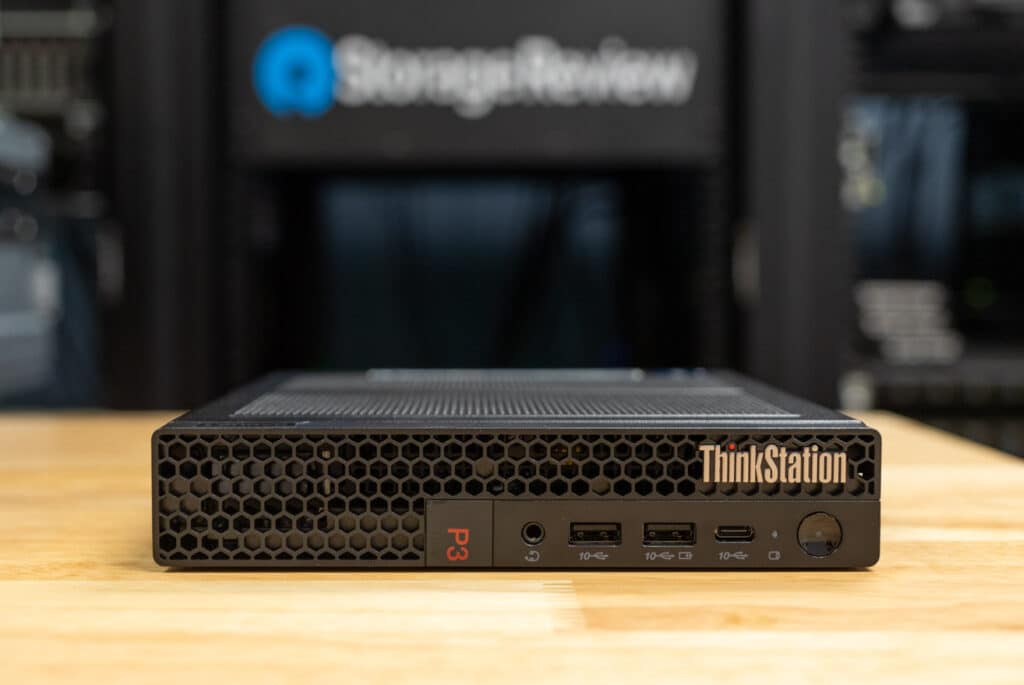
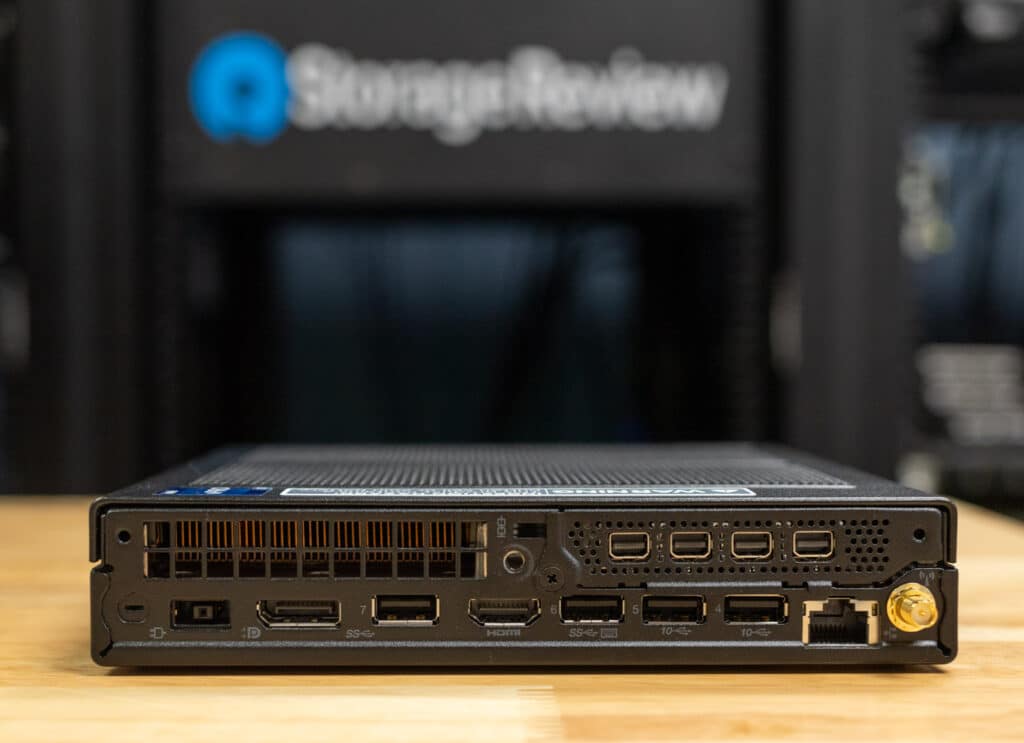
Here, we can see the unit with the NVIDIA T1000 card (with 8GB of GDDR6 VRAM) removed, showing how it fits within the system’s compact design. Alongside the GPU, we spot the Intel Wi-Fi 6E AX211 card (802.11ax 2×2 + BT5.1), providing speedy wireless connectivity and flexibility when needed. As mentioned earlier, the inclusion of the NVIDIA T1000 card expands the display capability of the ThinkStation P3 Tiny from just two onboard displays to up to 6 displays by adding four mini DisplayPort (mini DP) ports, making it an ideal solution for users requiring multi-monitor setups for enhanced productivity and visual performance.
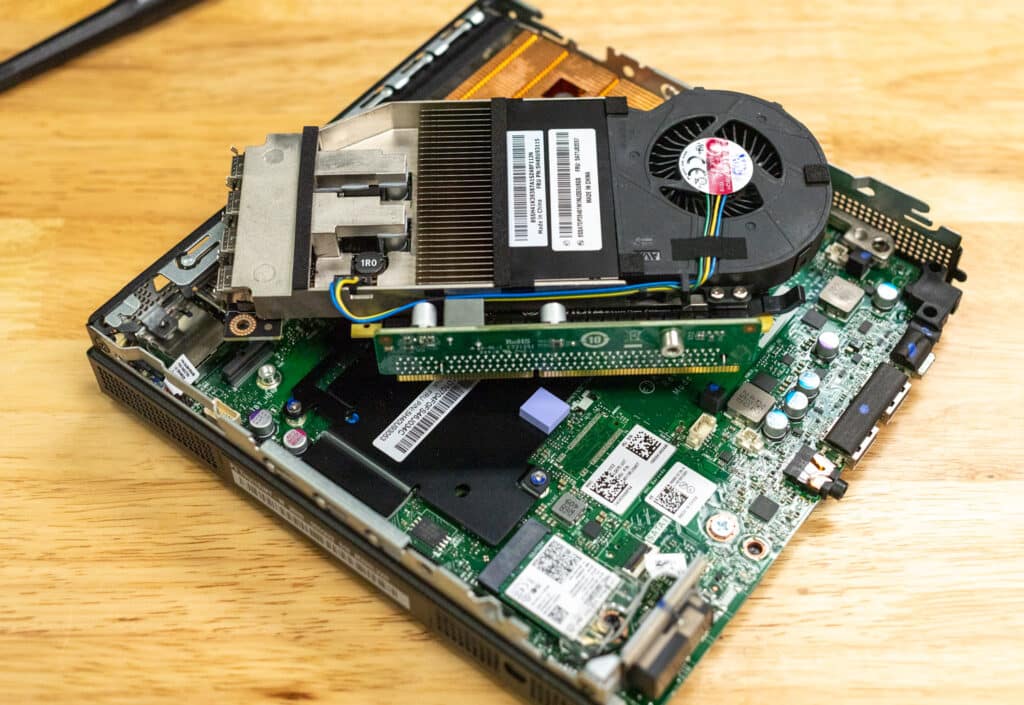
ISV Certifications for the ThinkStation P3 Tiny
Reliable performance is essential for professionals in fields like Media, Architecture, Engineering, and Data Science. The ThinkStation P3 Tiny’s ISV certifications ensure compatibility with key industry software, minimizing compatibility issues and maximizing stability. Lenovo collaborates with leading software vendors to certify that the P3 Tiny is optimized for complex workloads, providing professionals with confidence that it will support their specialized applications seamlessly.
| ISV Certifications |
|---|
| AutoCAD® |
| AVID® |
| Altair® |
| ANSYS® |
| Bentley® |
| Dassault® |
| Nemetschek® |
| PTC® |
| Siemens® |
ThinkStation P3 Tiny Workstation Specifications
| Component | Specification |
|---|---|
| Processor |
|
| Operating System |
|
| Graphics |
|
| Memory |
|
| Storage |
|
| Audio |
|
| Connectivity |
|
| Wireless |
|
| Design |
|
| Sustainability |
|
| Certifications / Registries |
|
| Power Supply |
|
| Preloaded Software |
|
| What’s in the Box |
|
ThinkStation P3 Tiny 30H0006QUS: Hardware Breakdown
For our testing, we utilized the ThinkStation P3 Tiny 30H0006QUS configuration that Lenovo sent us, equipped with robust hardware to handle various tasks. This build includes an Intel Core i7-14700 processor featuring 20 cores (8 performance + 12 efficiency) and a Max Turbo speed of up to 5.4GHz. With 32GB of DDR5-5600 RAM and a 1TB PCIe 4.0×4 NVMe SSD, this setup offers a strong balance of processing power, memory capacity, and storage speed.
- Processor: Intel® Core™ i7-14700, 20C (8P + 12E) / 28T, Max Turbo up to 5.4GHz, P-core 2.1 / 5.3GHz, E-core 1.5 / 4.2GHz, 33MB cache
- Operating System: Windows 11 64-bit (10.0.26100)
- Graphics: 1x NVIDIA T1000 8GB
- Memory: 1x 32GB SO-DIMM DDR5-5600 Non-ECC
- Storage Capacity: 1x 1TB SSD M.2 2280 PCIe® 4.0×4 Performance NVMe® Opal
- WLAN: Intel Wi-Fi 6E AX211, 802.11ax 2×2 + BT5.1, vPro
- Power Supply: 300W, 90% efficiency
- Resolution: 3840 x 2160 px
- Power plan: Lenovo Default
The system also features NVIDIA T1000 8GB graphics, which is ideal for professional applications and light graphics workloads. This specific build was tested to assess performance across various benchmarks and real-world use cases. Let’s look closer at how the system performed during testing.
SPECviewperf 2020
The first test we did was SPECviewperf 2020, the ThinkStation P3 Tiny, which demonstrated strong performance across various professional workloads. It excels in Maya-06 with a score of 63.21, showcasing its capability for general modeling and animation tasks, and in Snx-04 with a remarkable 165.51, highlighting its strength in engineering simulations. However, scores like 6.60 in Energy-03 and 11.38 in Medical-03 suggest more modest performance in data-heavy visualizations and medical imaging. Overall, the ThinkStation P3 Tiny is a solid performer for graphics and design-focused applications.
| SPECviewperf 2020 Viewsets (Higher is better) | ThinkStation P3 Tiny (Intel i7-14700, 32GB DDR5 RAM) – Score |
|---|---|
| 3dsmax-07 | 26.51 |
| Catia-06 | 21.91 |
| Creo-03 | 42.71 |
| Energy-03 | 6.60 |
| Maya-06 | 63.21 |
| Medical-03 | 11.38 |
| Snx-04 | 165.51 |
| Solidworks-05 | 39.28 |
Luxmark
LuxMark is an OpenCL GPU benchmark that evaluates rendering performance using two distinct scenes, Food and Hall.
- Food Scene: This test emphasizes GPU efficiency in smaller, detailed rendering tasks. The Dell OptiPlex 7420 All-In-One leads with a score of 1,953, followed by the ThinkStation P3 Tiny at 1,566. The OptiPlex 7020, with integrated graphics, trails far behind at 629, highlighting its limited GPU capabilities.
- Hall Scene: This test stresses performance in handling larger environments with complex lighting. The ThinkStation P3 Tiny dominates with 4,146, just edging out the OptiPlex 7420 at 4,098. The OptiPlex 7020 scores 1,359, reflecting its struggles with intensive workloads.
Overall, the ThinkStation P3 and OptiPlex 7420 are well-suited for demanding rendering tasks, while the OptiPlex 7020 is better reserved for lighter workloads.
| Model Test Results (Higher is better) | Food Score | Hall Score |
|---|---|---|
| ThinkStation P3 Tiny (Intel i7-14700, 32GB DDR5 RAM) | 1,566 | 4,146 |
| OptiPlex 7020 (Intel i7-14700, 16GB DDR5 RAM) | 629 | 1,359 |
| Dell OptiPlex 7420 All-In-One (Intel i9-14900 16GB DDR5) | 1,953 | 4,098 |
Blackmagic RAW Speed Test
The ThinkStation P3 Tiny shines in the Blackmagic RAW Speed Test, showcasing its powerful capabilities for high-resolution video playback and editing. With 66 FPS for CPU-based 8K decoding, the P3 Tiny proves its strength in handling demanding video tasks, making it an excellent choice for professionals in need of reliable performance in a compact form factor.
On the GPU side, the NVIDIA T1000 GPU in the P3 Tiny delivers 41 FPS for GPU-accelerated decoding using CUDA, significantly outperforming the OptiPlex 7020, which uses integrated graphics and struggles with GPU decoding, achieving only 19 FPS. This makes the P3 Tiny an ideal option for those who need strong GPU acceleration for video editing and playback.
While the OptiPlex 7420 All-In-One with its AMD Radeon RX 6500 and i9 processor leads in raw performance, the P3 Tiny stands out with its balanced performance and impressive GPU capabilities, making it a top choice for professionals seeking efficiency, power, and portability in a workstation.
| Model Test Results (FPS, higher is better) | 8K CPU (FPS) | 8K GPU CUDA/OpenCL (FPS) |
|---|---|---|
| ThinkStation P3 Tiny (Intel i7-14700, 32GB DDR5 RAM, Nvidia T1000 8GB) | 66 | 41 (CUDA) Discrete |
| OptiPlex 7020 (Intel i7-14700, 16GB DDR5 RAM, Intel UHD Graphics 770) | 90 | 19 (OpenCL) Integrated |
| Dell OptiPlex 7420 (Intel i9-14900 16GB DDR5, AMD Radeon RX 6500) | 98 | 37 (CUDA) Discrete |
Blackmagic Disk Speed Test
We ran the Blackmagic Disk Speed Test to assess storage performance, highlighting the ThinkStation P3 Tiny’s capabilities. With read speeds of 5,015.9 MB/s and write speeds of 3,915.4 MB/s, the P3 offers reliable performance suitable for most professional workloads. While it trails behind the OptiPlex 7020 and the OptiPlex 7420 All-In-One, the P3’s speeds indicate it can handle demanding tasks effectively, balancing cost and performance for users prioritizing a compact workstation.
| Model Test Results (Higher is better) | Read Speed (MB/s) | Write Speed (MB/s) |
|---|---|---|
| ThinkStation P3 Tiny (Intel i7-14700, 32GB DDR5 RAM) | 5,015.9 | 3,915.4 |
| OptiPlex 7020 (Intel i7-14700, 16GB DDR5 RAM) | 6,408.3 | 4,623.1 |
| Dell OptiPlex 7420 (Intel i9-14900 16GB DDR5) | 7,340.6 | 5,373.3 |
UL Procyon AI Inference Results (CPU)
UL’s Procyon benchmark evaluates workstation performance for professional applications. Across the board, the ThinkStation P3 Tiny Workstation delivered the best results, leading in most tests with standout times such as 1.08 ms on MobileNet V3, 32.38 ms on Inception V4, and 35.40 ms on DeepLab V3. Next was the Dell OptiPlex 7420 All-In-One, which showed solid performance with times like 34.28 ms on Inception V4 and 36.42 ms on DeepLab V3, though slightly behind the P3 Tiny. The OptiPlex 7020 followed, holding its own with a competitive 11.98 ms.
| Model (lower is better) | MobileNet V3 (ms) | ResNet 50 (ms) | Inception V4 (ms) | DeepLab V3 (ms) | YOLO V3 (ms) | REAL-ESRGAN (ms) | Overall Score |
|---|---|---|---|---|---|---|---|
| ThinkStation P3 Tiny (Intel i7-14700, 32GB DDR5) | 1.08 | 11.07 | 32.38 | 35.40 | 75.06 | 3867.04 | 125 |
| OptiPlex 7020 (Intel i7-14700, 16GB DDR5 RAM) | 1.33 | 11.98 | 36.46 | 38.17 | 90.31 | 3714.41 | N/A |
| Dell OptiPlex 7420 All-In-One (Intel i9-14900 16GB DDR5) | 1.37 | 11.63 | 34.28 | 36.42 | 85.47 | 3531.07 | 117 |
Geekbench 6 Results
In Geekbench 6 test, the ThinkStation P3 Tiny falls behind the OptiPlex 7020 in both single-core and multi-core performance. However, the Dell OptiPlex 7420 All-In-One takes the lead in both single-core and multi-core scores.
When it comes to GPU performance, the OptiPlex 7020 lacks discrete graphics, which results in lower GPU performance. The ThinkStation P3 Tiny, equipped with an NVIDIA T1000, takes the lead in this area, outperforming the OptiPlex 7020. The OptiPlex 7420 with its AMD Radeon RX 6500 also offers solid GPU performance but does not quite reach the P3’s score.
| Model (Higher is better) | CPU Single-Core | CPU Multi-Core | GPU Intel UHD 770 | GPU Discrete Graphics |
|---|---|---|---|---|
| ThinkStation P3 Tiny (Intel i7-14700, 32GB DDR5 RAM) | 2,830 | 14,150 | 8,204 | 39,235 (Nvidia T1000) |
| OptiPlex 7020 (Intel i7-14700, 16GB DDR5 RAM) | 2,858 | 17,116 | 8,317 | N/A (Intel UHD Graphics 770) |
| Dell OptiPlex 7420 All-In-One (Intel i9-14900 16GB DDR5) | 3,042 | 18,049 | N/A | 34,052 (AMD Radeon RX 6500) |
Y-cruncher Benchmark
Y-cruncher is a multi-threaded program used for benchmarking and stress-testing by calculating Pi and other constants. Both the OptiPlex 7020 and OptiPlex 7420 All-In-One were limited to the 1 billion digits test due to their 16GB of RAM, while the ThinkStation P3 Tiny, with 32GB of RAM, was able to complete larger tests.
Despite having more RAM, the ThinkStation P3 Tiny fell behind the OptiPlex 7420 in the 1 billion digits test. The OptiPlex 7020 performed well within its limitations, but both OptiPlex systems were constrained by their memory capacity when handling larger computations.
| Model (Lower is better) | 1 Billion Digits | 2.5 Billion Digits | 5 Billion Digits |
|---|---|---|---|
| ThinkStation P3 Tiny (Intel i7-14700, 32GB DDR5 RAM) | 32.38 sec | 101.81 sec | 230.78 sec |
| OptiPlex 7020 (Intel i7-14700, 16GB DDR5 RAM) | 28.73 sec | N/A | N/A |
| Dell OptiPlex 7420 (Intel i9-14900 16GB DDR5) | 26.50 sec | N/A | N/A |
Cinebench R23 Results
In Cinebench R23, the ThinkStation P3 Tiny outperforms the other systems with the highest multi-core score and MP ratio. The OptiPlex 7020 follows closely behind, with solid performance, while the OptiPlex 7420 All-In-One achieves a strong multi-core score but lags in single-core performance. The results highlight the ThinkStation P3 Tiny’s superior multi-core capabilities.
| Model (Higher is better) | Multi-Core Score | Single-Core Score | MP Ratio |
|---|---|---|---|
| ThinkStation P3 Tiny (Intel i7-14700, 32GB DDR5 RAM) | 19,548 pts | 2,011 pts | 9.72x |
| OptiPlex 7020 (Intel i7-14700, 16GB DDR5 RAM) | 17,723 pts | 2,043 pts | 8.67x |
| Dell OptiPlex 7420 (Intel i9-14900 16GB DDR5) | 18,627 pts | 1,762 pts | N/A |
Cinebench R24 Results
In Cinebench R24, the ThinkStation P3 Tiny excels with a strong multi-core score, MP ratio, and a notable GPU score. The OptiPlex 7020 delivers a solid multi-core performance but lacks a GPU score, while the OptiPlex 7420 All-In-One also performs well in multi-core tasks but lacks a GPU score and MP ratio data. Overall, the ThinkStation P3 Tiny stands out with its balanced performance across CPU and GPU tasks.
| Model (Higher is better) | GPU Score | Multi-Core Score | Single-Core Score | MP Ratio |
|---|---|---|---|---|
| ThinkStation P3 Tiny (Intel i7-14700, 32GB DDR5 RAM) | 2,059 pts (Nvidia T1000) | 1,145 pts | 118 pts | 9.67x |
| OptiPlex 7020 (Intel i7-14700, 16GB DDR5 RAM) | N/A | 1,007 pts | 120 pts | 8.39x |
| Dell OptiPlex 7420 (Intel i9-14900 16GB DDR5) | N/A | 1,085 pts | 126 pts | N/A |
Conclusion
The Lenovo ThinkStation P3 Tiny is a remarkable workstation that demonstrates how high performance can be packed into an ultra-compact 1L design. Powered by the latest 14th Gen Intel Core processors, it delivers excellent performance, making it ideal for professionals working with demanding applications. The system also features the ability to include discrete graphics like the NVIDIA T400 and T1000 graphics. Including ample storage and memory options, ensuring reliable performance across various industries, including Media & Entertainment, Architecture, Engineering, and Finance.
Despite its compact form factor, the ThinkStation P3 Tiny does not sacrifice connectivity or expandability. It offers a wide range of ports, wireless options, and customizable configurations, making it adaptable to the needs of various users. Its ISV certifications and support for up to six displays further enhance its suitability for professional use. At the time of review, the Lenovo ThinkStation P3 Tiny was priced at $1,745.15 (Lenovo store) for the tested configuration, which includes the 14th Gen Intel Core i7-14700 processor, 32GB of RAM, 1TB of SSD, and GPU. For more budget-conscious users, lower configurations start at $799. Pricing may vary based on customization and location, allowing flexibility for various professional needs.
Overall, the ThinkStation P3 Tiny is an excellent choice for businesses and professionals seeking a compact, high-performance workstation without compromising features or flexibility.
Lenovo ThinkStation P3 Tiny Product Page
Engage with StorageReview
Newsletter | YouTube | Podcast iTunes/Spotify | Instagram | Twitter | TikTok | RSS Feed

